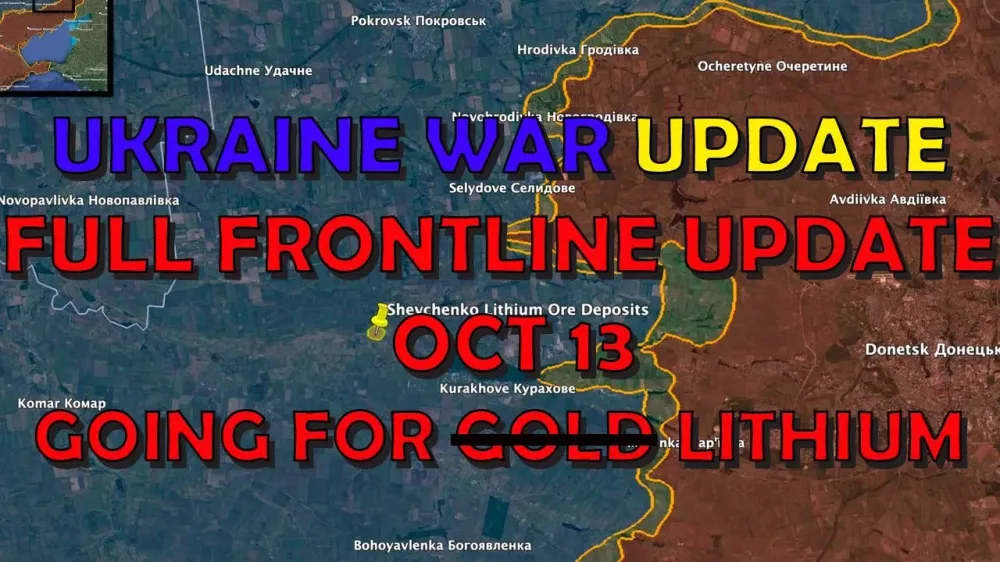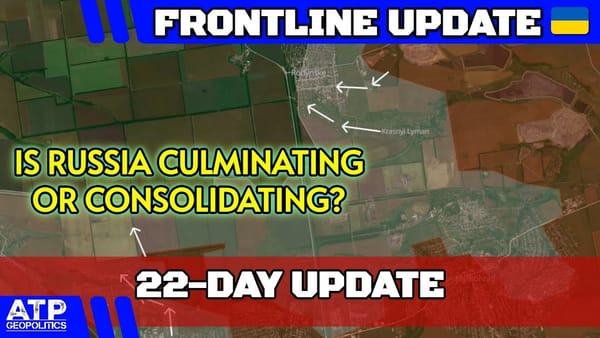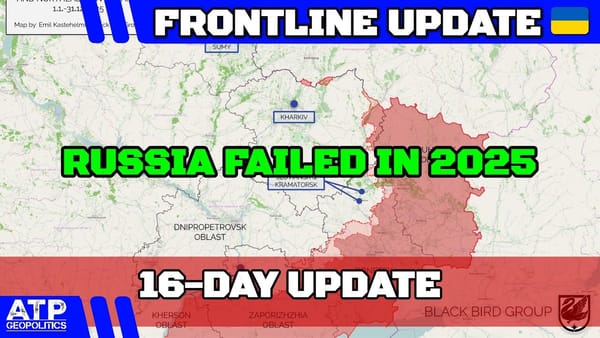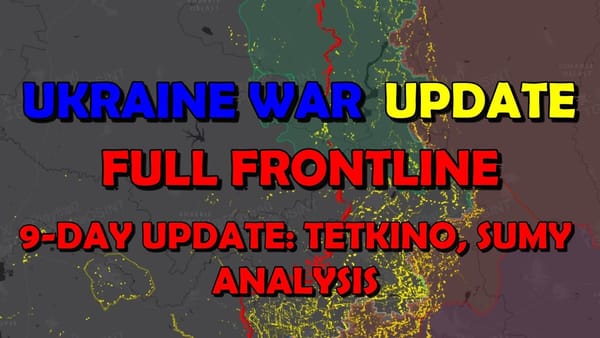Ukraine Conflict: Full Frontline Update
Table of Contents 📖
| Topic ID | Topic Title | Timestamp |
|---|---|---|
| 1 | Hello Team | 00:00-01:36⏩ |
| 2 | Kursk Oblast Frontline Update | 01:36-20:37⏩ |
| 3 | Kupyansk-Svatove-Kreminna Frontline Update | 20:37-29:06⏩ |
| 4 | The Importance of Lithium | 29:06-33:12⏩ |
| 5 | Wrap Up | 33:12-33:27⏩ |
"It has never been about...you know the Nazis and NATO or anything else. It has been about resources and money, which Russia needs due to its lack of being able to produce anything... something of worth."
Hello Team
🎦 00:00-01:36⏩
Jonathan welcomes viewers to another video, a Ukraine War Frontline Update. He lets viewers know this update focuses on Andriy Perpetua and Suriyak maps and thanks JR for automating the mapping process, which has significantly reduced the time it takes to produce. Jonathan also thanks Grimsoft (for help with Discord) and Ben (for help with AI and chapters).
Return to top⤴️
📍 FRONT-LINE UPDATE -🗺️ MAP LEGEND
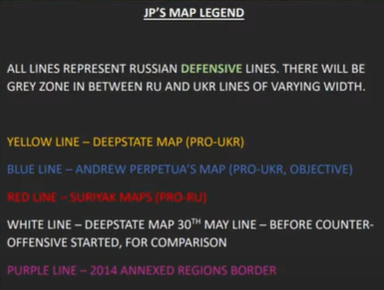
Kursk Oblast Frontline Update
🎦 01:36-20:37⏩
Jonathan begins by pointing out the large discrepancy between the Suriyak and Andrew Perpetua maps. He observes that the differences tend to always favour Russia, suggesting that perhaps Suriyak is too quick to confirm Russian gains. He notes more Ukrainian gains northeast of Matyanovka and reminds viewers that this area was intensely fought over at the beginning of the invasion, with the settlement now seemingly established but with Ukrainian gains.
- Jonathan also discusses the execution of nine Ukrainian soldiers in the settlement of Zeleny Shlyak, referring to it as another Russian war crime. He notes heavy fighting in the region, with conflicting claims regarding which side controls the settlement, reminding viewers that Andrew Perpetua is far more cautious about confirming gains than Suriyak.
- Jonathan cites a Clement Molle thread, in which Molle refers to the Kursk Oblast as a "graveyard" where heavy fighting over three months has failed to produce any decisive gains for either side, despite Russia committing 50,000 troops. Molle analyses the Ukrainian Kursk offensive, suggesting that while the area is heavily fortified and mined, the Ukrainians were able to advance 10-30km into Russian territory thanks to inadequate troop numbers defending the border.
- Jonathan then shares his view on why the Ukrainian Kursk offensive was strategically advantageous. He argues that Ukraine made a strategic decision to permit Russian gains around Prokhorovka to facilitate an attack on the weakest point of Russia's defences - the northern border. This decision, he argues, was the best use of troops and resources, inflicted proportionally higher casualties and damaged Russian morale. He also suggests the attack resulted in a PR win for Ukraine, boosting morale.
- Jonathan highlights how the Kursk offensive succeeded in pulling troops away from other areas of the front line (including Niger and Mali), provided new Ukrainian brigades with combat experience and negatively impacted the Russian railway network.
- Molle goes on to argue that while the Ukrainian offensive stalled south of Koronovo, and they failed to take control of the town, they were able to inflict heavy losses on Russian forces. He suggests that both the Ukrainians and Russians have launched counterattacks, making the situation more difficult to interpret, but evidence suggests that Ukrainian forces perform better on the offensive than the Russians.
- Jonathan closes by suggesting that the geographical features of the area, coupled with increased Russian air activity and the use of FAB bombs, is making it increasingly difficult for Ukrainian forces to hold their positions. However, despite the challenges, he highlights the Ukrainian success in destroying large numbers of Russian drones, suggesting increased proficiency in using FPV drones.
Kupyansk-Svatove-Kreminna Frontline Update
🎦 20:37-29:06⏩
Moving on to the Kupyansk-Svatove-Kreminna frontline, Jonathan highlights small Russian gains on the edge of Pistchane, noting Suriyak Maps reflects this gain, whilst Andrew Perpetua does not. He points out that Russian forces are getting closer to the Oskil River, which is a concern, but reminds viewers that the river offers a strong defensive position.
- Moving south, Jonathan confirms no change in Turetsk and New York, with both mappers agreeing. He also confirms no change in Chaviv Yar and Siversk, which is good news for Ukraine, and points out that Suriyak has dialed back the large gains they initially reported around Serebiyanka and Vykhno-Kamyansk.
- Jonathan reports small Ukrainian gains by Hrudivka, in the direction of Myrna Dolyna.
- He then moves on to the area west of Spirne, where Russian forces are having more success pushing further west towards Zarichne, with Ukrainian forces seemingly operationally surrounded. Jonathan highlights the big difference between the Suriyak and Andrew Perpetua maps in this area, with the latter suggesting Ukrainian forces may be able to hold out.
- Jonathan points out the significant difference between the two mappers south of Zeleny Hai and suggests that this might be due to the automated mapping process, which he is still getting used to. He also reports more Russian gains to the west of Rivnopil as they push towards Karlivka.
- Jonathan then moves on to talk about the area around Novoselivske, suggesting that Russian gains here could be strategically important, enabling them to outflank Ukrainian defensive lines. However, he expresses some uncertainty, adding that Russia's capacity to sustain multiple offensives, given their losses and lack of equipment, is questionable. He also acknowledges criticisms about the potential impact of redeploying Ukrainian troops from other areas of the front line to fight in the Kursk Oblast. He closes this section of the update by reminding viewers that the onset of autumn, with increased rainfall and mist, will likely slow down fighting across the entire frontline.
The Importance of Lithium
🎦 29:06-33:12⏩
In the final section of this update, Jonathan cites a German source that argues that Russia’s invasion of Ukraine has always been about seizing the country’s vast natural resources, rather than about “de-Nazification” or “NATO expansion”, highlighting the abundance of raw materials present in Ukraine.
- He goes on to explore this claim further by looking at the strategically important lithium deposits in more detail, pointing out that Russia has already captured some of these deposits and appears to be advancing on others.
- He refers to a map, highlighting the location of three known lithium deposits in the occupied territories:
- Polokhivka (Kirovohrad Oblast)
- Shevchenko (Donetsk Oblast)
- Dobra (Kirovohrad Oblast)
- and one unconfirmed site in Zaporizhzhia Oblast:
- Krutobalka
- Jonathan highlights the amount of lithium in Ukraine, estimated to be around 500,000 tons, would constitute 10% of the entire world’s reserves. In addition to lithium, he mentions the presence of other rare earth minerals:
- Tantalum
- Rubidium
- Neobium
- He concludes by reiterating the German source’s argument that Russia’s invasion has always been about resource grabbing, which is why it is imperative that Ukraine receives the support it needs to drive Russian forces out.
Wrap Up
🎦 33:12-33:27⏩
Jonathan thanks viewers for watching and expresses hope that the update was helpful. He signs off, letting viewers know he will speak to them soon.
Return to top⤴️
🤖❓ AI Debrief (post task) - anything the AI didn't understand
🤖💭 AI Plan (pre task) - the AI's step by step thought process
- Date: Extract the date and change the formatting from YYYYMMDD to DD/MM/YYYY. The date will be enclosed in `
` tags.
- Part: There is no "Part" in this video title, so the `
` tags will be empty.
- Listen to the video in its entirety, taking notes if necessary, to identify changes in topics/subjects. Each topic should be a concise summary/specific/quantified summary of the topic.
- Create a `
` for each topic, starting with id=1 and incrementing by 1 for each subsequent topic. The topic title should be detailed and specific.
- Identify the timestamps from the transcript for each topic title you created in TASK 2.
- Enclose the timestamps in `
` tags, using the format "start timestamp-end timestamp". Ensure the `id` attribute for the XML tag matches the `topictitle` tag.
- Timestamps should be in the format MM:SS (for timestamps less than 1 hour) or HH:MM:SS (for timestamps over 1 hour).
- Write a concise summary for each topic identified in TASK 2, paying attention to Jonathan's insights and analysis. The summary should include enough context so that someone who hasn't seen the video can understand what is being discussed. Use bullet points/numbered lists for clarity, if appropriate.
- Enclose each summary in `` tags, ensuring the `id` attribute matches the corresponding `
` and `
` tags.
- Choose a quote from the transcript to include in the summary. The quote should be thought-provoking or insightful and make sense when read independently from the rest of the summary.
- Enclose the quote in `
` tags.
- Make note of anything from the transcript that needs clarification. In this instance, there are numerous geographical locations mentioned in the transcript that require clarification to ensure they're spelt correctly in the summary.
- Enclose any queries in `
🤖❓ AI Debrief (post task) - anything the AI didn't understand
` tags.

